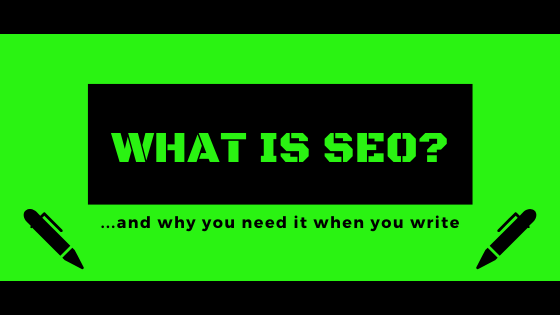WHAT DOES SEO STAND FOR?
SEO stands for search engine optimization. What that means in layman’s terms is it’s the process we use to get traffic to a website.
Whenever people search a term on the Internet, that search is powered by certain engines, delivering the results.
There are various search engines on the Internet. Some are less known than others, but the major leading search engines are Google, Bing, and Yahoo. Google, being the leading contender.
Other lesser-known search engines are Amazon, and YouTube, but make no mistake, they are powerful.
Think of it this way, when you want to know something you type it into Google. Google then searches websites to find your answer. That process of searching is called SEO.
I never understood SEO until I started my website. Even then, as a beginner blogger, I didn’t realize the impact that search engines had on the content that I was writing.
I wanted Google to send traffic to my website, but I didn’t just want traffic, I wanted people who are genuinely interested in what I have to write about.
Search engines use algorithms to calculate how to direct the right traffic to your specific website. For the most part, those algorithms are a mystery. Many bloggers have tried to crack the code for years to no avail.
It’s near impossible to figure out algorithms. For one thing, they keep changing. Google specifically changes the algorithms on a regular basis.
Learning SEO is challenging for a beginner. People can go to school and get degrees on the subject, or they can learn on their own. It depends what you want to do with it, and how much of an expert you want to be in this area.
Not all bloggers need to be experts in search engine optimization. Not all writers need to understand every aspect of SEO.
As far as I’m concerned, a writer just needs to understand that there is a process that brings people to your website, or book, or YouTube channel, and consider how that impacts what you do.
WHY DO WRITERS NEED IT?
I’m used to think that SEO didn’t matter. When I first started my website, I wanted to choose topics on things that I was interested in.
Why would I want to write topics on the things that I wasn’t passionate about?
I struggled with this for a long time. In fact, I was adamant to choose only those things that were relevant to my expertise.
I thought that I couldn’t be authentic if I had to worry about search engine optimization. I thought that choosing topics just to get traffic, was a deceiving tactic.
I was wrong.
I didn’t understand how search engine optimization really impacted me as a writer. I didn’t understand that Google was sending visitors to my website because of keywords I was using or not using.
As a writer, my responsibility to my reader was to not only write about topics I was familiar with, but also to get them to my website.
For example, if I wrote a book about magical realism and didn’t use the right keywords, Google might send the wrong kind of traffic. Google might think my book is it about doing magic tricks.
How could I expect the right kind of traffic if I am not specific enough with my word choices? That’s what SEO is. As soon as I learned that, I started choosing the topics that I write about in a different way.
It wasn’t that I was not being authentic. Writing a book on the definition of magical realism is something I’m interested in, but I need to be aware of the specific word choices that I use to create my book or nobody will find it.
Granted, I still have a lot to learn about search engine optimization, but I think I know the basics now. When I write, I search for words and phrases that other people are looking for. Those words are called keywords.
WHAT IS KEYWORD RESEARCH?
When I started writing books, I had no idea what keyword research was. I wish I would have at that time, because I would have been able to bring more traffic to my writing.
There’re some books that I never would have written simply because nobody was interested in that specific topic.
Take for example, Amazon. When I find a keyword that has a high volume of searches, I know people are interested in that topic and I can then write a book on it.
If I want to write a book about home sewing for example, I will search Amazon for how many times people search in a month. If it’s got a high search volume like 10,000 a month, I will probably write the book.
If it has a low search volume of 50, I know people aren’t really interested in that and I probably wouldn’t write the book.
I now use this specific SEO practice on my blogs as well as books I write. You can use SEO practices with nonfiction but also with fiction writing.
Fiction writing is a little trickier for search engine optimization, but words are powerful no matter where you use them. If you want to write a book about mermaids for example, figure out how often the word is searched in a month.
If it’s searched a lot, it would be a great idea for a fiction novel. If it’s not, then consider a different phrase or word that defines what you’re writing that does have a high search volume.
I find keyword research to be one of the best ways to catapult you’re writing to the next level. It’s fascinating that by simply using the correct word in your title, your book will do better than those with a poor SEO title.
BEST SEO PRACTICES
As I said before, the best SEO practices start with a good title. If you don’t use high-volume keywords in your title, no matter if it’s a book or a blog, Google won’t send traffic. Amazon won’t send traffic. SEO won’t work for you.
The following is a list of best SEO practices in point form. Make sure you consider these before writing your next novel, whether that be fiction or nonfiction. Blog posts also must be SEO friendly, in order to get optimized traffic.
- Use keywords in meta description
- Write content with targeted keywords
- Include keywords in H1, H2, or H3 header tags
- Practice internal page linking
- Name each image with ALT tags
- Do keyword research before you write
- Use keyword research tools
- Take advantage of WordPress SEO plugins

BEST SEO PLUGINS AND RESEARCH TOOLS
If you have a website on WordPress, you will want to install an SEO plugin. I use the All in One SEO plugin for some of my sites, and for others I use the Yoast SEO plugin.
I don’t see any difference at all.
There is an ongoing debate about which SEO plugin is the best. Personally, I think they both do a good job with no major differences.
I think it’s mostly about personal preference because both plugins are amazing. As long as you have a plugin for search engine optimization, that’s all that matters.
You can also track SEO through Google analytics. All you have to do is set that up on your site, and away you go. You’ll be able to see how well a certain article is doing, and figure out if you need to change keywords to get better results.
I can go into more detail as to what specific analytic program to use on your website, but generally it’s just a matter of personal preference there as well. As long as you have a way to track your SEO, that’s all that matters.
As for keyword research, there are several tools that you can use to make this process easier. You can either purchase software or use some of the free software out there.
I started using free software called Keywords Everywhere, but when it became a paid tool I started using something else.
Personally, I don’t want to have to pay for every kind of SEO tool just to write. I find there’s enough expenses as a writer and content creator, that I don’t need to spend all my hard-earned money on things I can find for free.
There are many free keyword tools at your disposal. I use Google trends, and Ubersuggest. I am grateful to those people who put out free tools because if it were not for them, most writers and bloggers would simply give up.
I know I would because making a living as a writer doesn’t happen overnight. It takes years to start making an income from content creation and book sales. Forking out money for subscriptions to this and that would simply be a hardship to most struggling writers.
If you do want to purchase a quality research tool, SEMrush is one of the best paid tools. However, there are many others. Below is a list of suggestions.
BEST FREE KEYWORD RESEARCH TOOLS
BEST PAID KEYWORD RESEARCH TOOLS
- SEMrush
- LongTailPro
- SpyFu
- SerpStat
- Moz
- Ahrefs
- Sistrix
- Market Samurai
- KNIME
- KWFinder
- SEO Cockpit
- SerpWoo
- NetPeak
- BuzzSumo
- Soovie
- Wordtracker
- WordStream

CONCLUSION
In conclusion, it doesn’t matter whether you fully understand every aspect of search engine optimization or not, it only matters that you know there is a driving force behind what you write.
If you can at least be aware that keywords can make or break your writing success, then you’re on the right path. Just stick with the SEO basics, and don’t let yourself get confused or obsessed over it.
Understanding algorithms and how search engines work is it important, but let’s face it, we are writers and need to focus on that instead of website design.
All I know is that I now do keyword research for everything no matter if it’s for my next book or for my next blog. I want Google to find whatever I write and bring the traffic to me.
I want that for you as well, so be sure to follow the best SEO practices to get there.
Happy writing!
_____________________________________________________

Author Kathleen Morris
Kathleen Morris is a successful published author, blogger, and YouTuber. She enjoys writing about things she’s passionate about and making a difference in the world.

